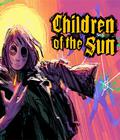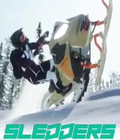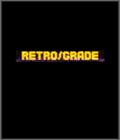For rhythm games, there is life after plastic instruments. It isn't as if Beatmania, Guitar Hero and Rock Band were the ones that originated the genre, as games like Vib-Ribbon, Parappa the Rapper and Frequency brought rhythm to gamers with standard controllers way before plastic Stratocasters invaded homes. The post-instrument era for rhythm games has been reborn thanks to the efforts of independent developers who feel the need to give other time-tested genres some beats. Audiosurf mixes music with puzzle scoring action, Dyad uses music as a racing instrument, and the Bit.Trip series uses rhythm to power everything from a Pong homage to a constantly running platformer. Retro/Grade, a PSN exclusive from 24 Caret Games, has the same mentality, as it mixes a rhythm game with a standard shooter but gives it a unique twist.
The story mimics the game's sales pitch, as it turns a standard plot on its head. You play the role of Rick Rocket, a hero who single-handedly saved the galaxy from an evil alien empire. Just as you begin your flight toward your home planet, a mysterious time rift opens up and pulls you in. The destruction you caused during your fight against evil created this rift, which poses a bigger threat to the universe. To save the universe, you must do what few pilots have ever thought of doing: replay all of your actions in reverse to create the very things you destroyed in order to repair the space-time continuum.
Retro/Grade is a reverse side-scrolling shooter, which needs a bit of explanation. Instead of flying at the enemy, you fly backward and watch as your enemies form up after exploding into bits. You don't shoot bullets and weaponry as much as you absorb it while the enemy does the same to its projectiles. To make the idea easier to understand, it's treated like a rhythm game where music aids you in capturing bullets while your flight pattern is restricted to set lanes, the number being dependent on the difficulty level that you've set. There's even a chance to pull off a temporary multiplier boost, similar to the overdrive effect found in most rhythm games. Other than that, the game follows basic shooter conventions, such as avoiding enemy fire and gravity bombs. The only other difference is that getting hit by enemy fire or missing bullets results in a loss of energy; if depleted, it would destroy the universe.
Gameplay aside, you start your campaign at what should be the last level and go backward to the first level. Your score also starts off rather high and gets reduced every time you successfully catch your bullets and laser blasts. It's a small thing, but it shows that the team paid attention to details.
The title is split into two modes that use the features of the reverse side-scrolling shooter to their fullest. The campaign mode lets you traverse 10 levels from the end credits to the very beginning of the game. Oddly enough, enemy progression follows a more traditional shooter, with the last level here working more like the first level in any other game and vice versa. The story puts a humorous spin on things by stating that the big boss is the first target, making the rest of the mission easier, but the adherence to a more traditional flow means that both the progression system and number of stages feel right.
The second mode is challenge mode, which is the heart of the game for a number of reasons. The mode features 130 different challenges, spanning every difficulty level and featuring all of the songs in lots of different ways. Some of the challenges are mundane, such as getting to a certain multiplier number or playing with the song set to a slightly faster or slower speed. Other challenges are much more demanding, such as getting a perfect run or getting the highest score per bullet. There are even a few other wacky challenges, such as playing with no color differentiation per lane, playing from a reverse viewpoint, or playing with disco colors. Each of the challenges is laid out in a map similar to Starfox 64 or Super Mario Bros. 3, complete with branching paths and warp zones. Clearing any of the challenges near a padlock unlocks a few other extra goodies, such as artwork, the ability to play the tunes in a separate music player, or changing your ship design. Since there's no prerequisite to the mode, players can skip over the campaign if they want something challenging right off the bat.
Retro/Grade's humor is entertaining. As mentioned earlier, the story in the campaign mode doesn't take itself too seriously, and it shows in the synopsis for each of the 10 levels. Though never told in cut scenes, the descriptions for each level talk about things like Rick fighting aliens on a planet just to lower his hotel bill or fighting because it was something to do before visiting his parents. It elicits a chuckle or two from those who are willing to read it. The same goes for the challenge level names and song titles, almost all of which reference a popular meme from the last few years. Finally, the ships that you unlock pay homage to other independent works, and whether it's the description for the Minecraft ship (complete with blueprint list) or seeing a plush dinosaur or OctoDad rock out to the background music, there's always some video game humor in the mix.
The campaign comes in at just the right length while the challenge mode offers enough goals and secrets to keep gamers occupied for a while. However, both modes reveal the title's one drawback, and that's the lack of music. There are only 10 musical tracks, all of which fall into the electronica/chiptune genre. The songs are a decent length, and while they're good, they aren't catchy, and those who don't have an appreciation for the genre will feel that the tunes sound too similar. Even for genre aficionados, the small track list means that the songs will be repeated often; it's fine for the campaign but not for the challenge mode. The large number of challenges means that you'll hear certain tunes repeated far too often, and unless you're playing the game in short bursts, you'll get sick of the soundtrack during longer play sessions.
Interestingly, there are two control schemes available. The standard controller is a more natural fit, especially since the controls for it are rather simple. Unless you employ your star power often or like manipulating time (both handled by shoulder buttons), you'll spend most of your time with the d-pad and the X button. You can use the left analog stick instead, but since the ship only handles at one speed and moves snugly into each lane, the d-pad is more accurate. If you own one, you can use the guitar from either Rock Band or Guitar Hero to control the game, with the fret buttons moving the ship from lane to lane and the strum acting in place of the X button. Unfortunately, with no PS3 guitar in our possession, we're unable to confirm whether or not an instrument makes for a better controller than the standard Dual Shock 3 for this title.
Graphically, Retro/Grade is quite flashy. Every environment you encounter pulsates with the beat, and depending on the ship you take, you may be able to see your pilot do the same. Enemy ships have some designs that fit the standard sci-fi mold, but they look nice together due to the large amount of particle effects in play. The bullets are colored nicely, and other effects, like messing up the time-space continuum by missing your own bullets or getting hit by enemy fire, look great. About the only issue you'll have with the game has to do with the fact that it often gets so busy that it's sometimes difficult to see the bullets, especially in the higher difficulty levels. You'll get used to it, but that doesn't make it any less overwhelming.
Retro/Grade is a novel game with a great concept and great execution but suffers from an unfortunate pitfall. Disguising a rhythm game as a shooter is appealing, especially since it has loads of humor and emphasizes going in reverse. The mechanics work very well for any gamer of any skill level, and the game feels like it comes in at just the right playtime length. The short selection of music is noticeable enough that you'll wish you could hear something new, especially during the large number of challenge levels. However, that shouldn't stop fans from trying this inventive and entertaining game.
Score: 8.0/10
More articles about Retro/Grade











 Retro/Grade is the first game played entirely in reverse. Retro/Grade fuses the thrills and visuals of a shooter with the broad appeal of a rhythm game. Players are forced to dodge enemy projectiles while positioning the ship to be in the correct place to fire lasers when their shots come back to them.
Retro/Grade is the first game played entirely in reverse. Retro/Grade fuses the thrills and visuals of a shooter with the broad appeal of a rhythm game. Players are forced to dodge enemy projectiles while positioning the ship to be in the correct place to fire lasers when their shots come back to them. 








